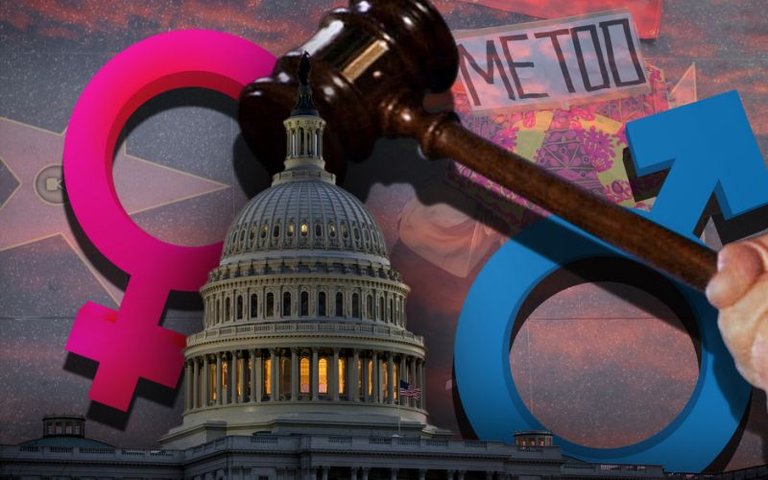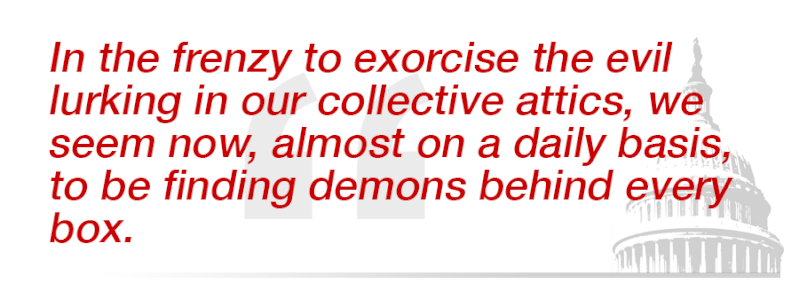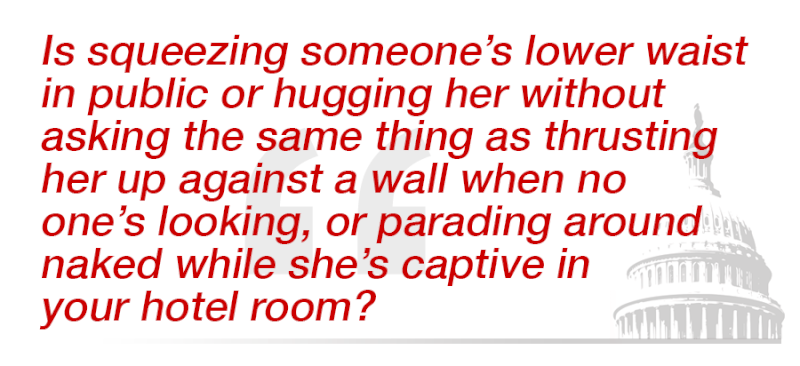( )Yahoo News photo illustration; photos: J. Scott Applewhite/AP, AP, Lucy Nicholson/Reuters
)Yahoo News photo illustration; photos: J. Scott Applewhite/AP, AP, Lucy Nicholson/Reuters

A few weeks ago, I wrote a satirical column aimed at some of the well-known sexual predators who’ve been exposed in this strange season of national catharsis. Specifically, I was a little disgusted by what has become the clichéd apology for men in media, politics and entertainment — a predictable statement in which they claim to make no excuses and cast no aspersions on the women they’ve victimized, but then slyly attempt to do exactly that, as if we might not notice.
Up to that point, it seemed to me that virtually all the famous men humiliated by the #MeToo uprising had long and well-documented histories for which to answer. Americans had decided, all at once, that it really wasn’t OK to behave as if your female colleagues were there to satisfy your every urge, no matter how talented or highly paid you might be. Good for us.
At times of shifting mores, though, it can be hard to discern the boundary between reckoning and recklessness, and I worry that in recent days we’ve crossed it. This isn’t an easy thing to talk about in the current environment, I realize — but that in itself is part of the problem. To establish yourself as an enlightened man (or employer) right now seems to require rushing to judgment, ignoring ambiguity and silencing dissent.
In other words, the power corridors of the country are starting to feel like one of these college campuses where free speech and due process are cast aside as tools of the oppressor class. And that’s exactly what people in my business are supposed to stand against, not for.
Before we go any further, let’s stipulate that most of the public floggings that began with Harvey Weinstein and the New York Times in October have been, near as I can tell, entirely justified. In the horrifying cases of Weinstein, Mark Halperin, Charlie Rose, John Conyers, Kevin Spacey, Matt Lauer, Mario Batali and others (including, of course, Roy Moore, may his political soul rest in peace), you’ve had legions of accusers, specific allegations and meticulous journalism.
In all but a few instances, you’ve also had some acknowledgment, however begrudging, from the perpetrator himself.
I know or have met a few of the women who’ve come forward in these scandals, and I have only the most remote appreciation for what it cost them, personally and professionally, just to have landed, by virtue of their talent, in the wrong workplace. I’m awed by the courage it took to publicly face the men who tormented them.

All of us who’ve worked in journalism or politics or moviemaking have to live with the shame of having failed those women (and a few men, too). It’s a blow to our moral standing.
But in the frenzy to exorcise the evil lurking in our collective attics, we seem now, almost on a daily basis, to be finding demons behind every box.
Al Franken gets lumped in with an accused rapist like Weinstein over allegations that he tried to kiss a series of women without asking, and because he seems to have a creepy habit of squeezing them around the waist during photo ops. The radio legend Garrison Keillor, at 75, is blacklisted because, at least from what he told a reporter, he touched a woman’s exposed back and immediately apologized.
This week, the New Yorker writer Ryan Lizza, a friend and an uncommonly thoughtful journalist, was fired for undisclosed reasons having to do with sex, based on the complaint of one woman who remains anonymous. The public radio host Tom Ashbrook, whom I’ve known and admired for decades now, was sent home from WBUR in Boston after being accused — again, by unnamed colleagues — of doling out unwanted hugs and massages.
To be very clear, I don’t know the underlying circumstances in any of these cases, and I can’t say for certain that people I’ve known for years don’t lead weird dual lives or treat women differently than they treat me. If a career in news teaches you anything (or should, anyway), it’s that reality is often infinitely more complex than the available facts.
I’m not saying we should give everyone a pass on all but the most damning behavior, either.
But I’d think we would at least want to consider what these men are alleged to have done, and by whom, and how pervasively, before deciding that they’re the same as a Charlie Rose, who apparently insisted on showering in front of his female subordinates, or a Matt Lauer, who stands accused of bending one over a desk.
One of the most powerful voices on the issue of sexual harassment belongs to Sen. Kirsten Gillibrand, to her enduring credit. (Her comments on the issue earned her a nasty tweet this week from President Trump, who remains the one public figure with an expansive and well-documented record of harassment who has evaded all consequence.)
Here’s what Gillibrand said at a news conference in Washington last week, calling for Franken’s resignation: “I think when we start having to talk about the difference between sexual assault and sexual harassment and unwanted groping, you are having the wrong conversation. You need to draw a line in the sand and say none of it is OK. None of it is acceptable.”
Of course it isn’t. But with all due respect, as they like to say in the Senate, I think she’s wrong to suggest there’s no room to differentiate here. And that is exactly the conversation we should be having right now, because no one should be drawing any lines without first establishing guilt, and because the nuance always matters.

Is squeezing someone’s lower waist in public or hugging her without asking the same thing as thrusting her up against a wall when no one’s looking, or parading around naked while she’s captive in your hotel room? Is drunkenly trying to kiss a co-worker in a bar really the same thing as demanding oral sex in exchange for a job?
Does it matter if there’s one woman complaining, anonymously, versus a half dozen on the record? If a guy claims to have been in a consensual relationship, should we automatically dismiss him as delusional?
Facts and contexts are relevant. This is why the penal code provides for myriad definitions and degrees of serious crimes.
Show me a society that decides all transgressions are the same, and I’ll show you one without reason or compassion. Show me a citizenry that suspends its freedoms and standards in pursuit of the privileged, and I’ll show you one that is bound to terrorize its least powerful.
What we have now, I fear, are institutions scared to death of lawyers and bad publicity, rushing to catch up to swift-moving public opinion, firing first and asking questions later. We have loud, often well-meaning voices on social media coalescing into a virtual street mob, circulating rumors whose origin can’t be named.
I’m guessing some of this was inevitable after Trump’s election, and it grows from a noble instinct on the left. There’s a feeling that Trump got away with gross misogyny, and that there needs to be some justice, some turn in the culture that says we won’t tolerate these kinds of attitudes anymore. I’d argue that a lot of justice has been meted out in recent weeks.
But you can’t sustain justice without fair-mindedness and some sort of credible process. Without those things, you won’t get a better, more inclusive media or governing class.
Congratulations @kamalahmed! You have completed some achievement on Steemit and have been rewarded with new badge(s) :
Click on any badge to view your own Board of Honor on SteemitBoard.
For more information about SteemitBoard, click here
If you no longer want to receive notifications, reply to this comment with the word
STOP